|
Vince Rizzo and his wife Joyce both smoke. Each thinks the other has quit smoking, and both go to harrowing lengths to hide their cigarettes from each other.
This is as much as I would like to tell you about City Island, Raymond De Felitta's charming, touching and exhilarating comedy-drama, other than to urge you to see it. Unfortunately, every reviewer in America has already spilled the beans about where Vince (Andy Garcia) is really going when he heads for his nightly "poker game;" why Vince brings paroled ex-con Tony Nardella (Steven Strait) home to live with his family, and how Joyce (Julianna Margulies) reacts to this; what daughter Vivian (Dominik Garcia-Lorido, Andy Garcia's real-life daughter) really does when she's away at "college;" and what son Vince Jr. (Ezra Miller) is up to when he surfs the Web at night.
I went to see City Island knowing nothing more about it than its trailer and the Washington Post's resounding praise for the film's ensemble cast. I may as well tell you what the film's trailer reveals: Vince, a corrections officer (he hates the term "prison guard") at a prison in the Bronx, has secret ambitions to become an actor, but is too embarrassed to tell his family he's going to acting classes instead of poker games. (Alan Arkin, playing Vince's acting teacher, has a hilarious rant early in the movie about the devastation wrought on the thespian art by Brandoesque pregnant pauses. "I've lost five years of my life to pauses," he growls.)
The Rizzos live on the eponymous City Island, a unique haven just off the shoreline of the Bronx. "It's like a cross between New England and Washington Heights!" exclaims Molly Charlesworth (Emily Mortimer), Vince's fellow acting student, when she first sees the place. As Vince tells us during his introductory narration, people on City Island divide the world into "clam diggers" (people born, bred and living on the island) and "mussel-suckers" (people who move to the island from elsewhere, or the very, very few natives who leave it).
The location provides color to the movie, but mostly it is just backdrop to a favorite theme of De Felitta's (more on that later): the ways in which families-- especially Italian-American ones, though the rules are universal--become dysfunctional. In City Island, the Rizzo family is drowning in secrets, some more scandalous than others. Embarrassment and shame prevent Vince, Joyce, Vivian and Vince Jr. from revealing themselves; but the atmosphere of secrecy in the house is driving the people inside it near the breaking point, far worse than if they knew all. The result is that civility within the family is as rare as borscht on the dinner table—a place that, in the Rizzo household, makes All in the Family look like The Waltons. It doesn't help that the Rizzos, like all too many people in the real world, aren't particularly good at articulating their everyday thoughts. A conversation between Vince and Joyce, showcased in the trailer, gives you the flavor:
VINCE: In honor of our daughter being home from college, I think Sunday dinner should be—nice.
JOYCE: So you don't think my Sunday dinners are nice?
VINCE: I'm just saying that Sunday dinner should be nice!
JOYCE: What—you want balloons or something?
Given the general tone of discussion between Rizzo family members, plus the ever-growing weight of secrecy surrounding them, it's no surprise their situation reaches the brink of tragedy; but this is followed by comic catharsis and a happy ending. Precisely how this happens, I prefer for you to discover yourself, There are some who might disagree with the premise that total disclosure equals happiness (see Ibsen, Henrik, and O'Neill, Eugene), but such dour thoughts interfere with family barbecues. Besides, I guarantee you will fall in love with all the characters in City Island, especially Vince.
It may be glib to call City Island this year's Little Miss Sunshine, but the comparison is apt. Both films deal with families collapsing under the weight of their own dysfunction, whose individual members test the extremes of eccentricity, but who rediscover their love and respect for each other at the last possible minute. Both films also have ensemble casts that would be difficult, if not impossible, to improve upon. One difference is that, whereas Little Miss Sunshine is a cast of equals, Andy Garcia is unquestionably the star of City Island. His Vince Rizzo is a classic American dreamer, driven by visions he can barely articulate but which form the center of his life. Vince has lived so long with his dreams, rarely if ever revealing them to anyone, that when he finally has a chance to achieve them he doesn't know what to do. Reading for casting directors at his first-ever audition, he lapses helplessly into a fourth-rate Brando imitation.
This is not to say that the other cast members fade in comparison with Garcia. As Joyce, Margulies more than holds her own, conveying the sad, angry confusion of a woman who no longer knows who she is, or who she's married to. But all the actors are excellent, and all the characters have wonderful, telling moments, such as Tony giving Vince an impromptu acting lesson or Molly, at long last, revealing her own aching secret.
Raymond De Felitta is a filmmaker who was unknown to me before City Island, although I had heard of some of his previous films. 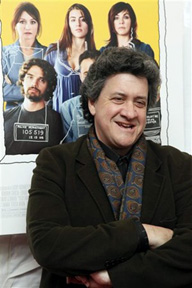 City Island motivated me to seek out more of De Felitta's films, as did reviews of City Island that said De Felitta's 2000 film Two Family House was even better. On Netflix, I rented all of De Felitta's feature-length films currently available on DVD: Two Family House, The Thing About My Folks (a 2005 film in which De Felitta was the hired director for screenwriter-producer-star Paul Reiser), and the 2007 documentary 'Tis Autumn: The Search for Jackie Paris. (Café Society, De Felitta's 1996 debut feature, has been released on DVD but is nearly unavailable; Netflix doesn't carry it, and when I checked Amazon, it had only three copies for sale, all from different retailers.) City Island motivated me to seek out more of De Felitta's films, as did reviews of City Island that said De Felitta's 2000 film Two Family House was even better. On Netflix, I rented all of De Felitta's feature-length films currently available on DVD: Two Family House, The Thing About My Folks (a 2005 film in which De Felitta was the hired director for screenwriter-producer-star Paul Reiser), and the 2007 documentary 'Tis Autumn: The Search for Jackie Paris. (Café Society, De Felitta's 1996 debut feature, has been released on DVD but is nearly unavailable; Netflix doesn't carry it, and when I checked Amazon, it had only three copies for sale, all from different retailers.)
According to www.raymonddefelitta.com, De Felitta is a jazz pianist as well as a filmmaker, and has released two CDs. His films have won Audience Awards at every festival where they have premiered: Two Family House at Sundance, The Thing About My Folks at Santa Barbara, and City Island at Tribeca. ('Tis Autumn won Best Documentary at the Kansas City Film Festival.)
Family dysfunction is the common element in all of De Felitta's films so far--even The Thing About My Folks, the one he didn't write. That film is mostly a star vehicle for Reiser and Peter Falk—the latter of whom gives one of the finest, funniest performances of his career—but the theme is appropriate for De Felitta. Falk and Reiser, playing father and son, drive each other crazy, and both have astringent, long-distance relationships with the daughters/sisters of the family. But an impromptu road trip—occasioned by the disappearance of the family matriarch, played by Olympia Dukakis—creates a new bond between father and son, as they each come to learn and appreciate virtues they didn't know the other possessed.
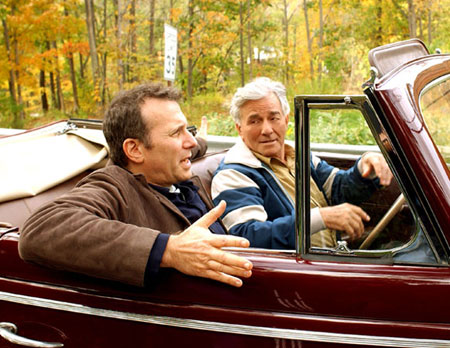 |
But The Thing About My Folks and even City Island are eclipsed by Two Family House, a tiny, flawless gem of a film that deserves to be acknowledged as a classic. Set on Staten Island in 1956, the film tells the story of Buddy Visalo (Michael Rispoli), a Vince Rizzo-like dreamer with a string of failed business schemes and a disapproving wife, buying the eponymous house with the plan of turning the first story into a tavern and the second into his home. However, Buddy has to deal first with O'Neary (Kevin Conway), the drunken, hostile Irishman who is the current tenant of the second story, and Mary (Kelly Macdonald), O'Neary's much younger, pregnant wife. The situation comes to a head—or so it seems—when Mary gives birth to a baby boy, who is black.
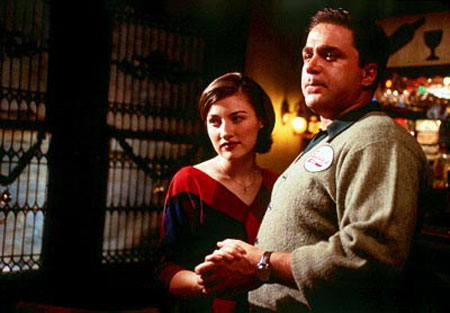 |
And from there, dear readers, I should be tied up in a sack and thrown in the Hudson rather than tell you anything further about the plot of Two Family House. According to Netflix, De Felitta based his screenplay on the life story of his own uncle; in any case, Buddy Visalo is at least as lovable a character as Vince Rizzo, and Rispoli is marvelous playing a working-class guy from Staten Island who finds his humanity even as his wife and friends think he's throwing his life away. Macdonald is equally wonderful as a hard-luck young woman, inured to the cruelty of others, who is confused by Buddy's stumbling efforts to be kind. Reminiscent of both Marty and Moonstruck, but with a delicate magic all its own, Two Family House reminds us that people who seem to be flouting community values may, in fact, be transcending them. Some critics have said that City Island--louder and quirkier than Two Family House, with a greater quotient of Hollywood-style wish fulfillment—is inferior to the earlier film, and they are right. Two Family House is a masterpiece, City Island merely a vastly entertaining, beautifully acted movie.
It would be inappropriate to conclude this review without mentioning 'Tis Autumn, which speaks to so many of De Felitta's concerns. As much about the filmmaker as his subject, 'Tis Autumn details De Felitta's efforts to track down jazz singer Jackie Paris, of whom he had never heard until a Los Angeles radio station played one of Paris' songs in the early 1990s. De Felitta snapped up what few Paris recordings he could find, in long searches of specialty record stores and the Internet, but ended his search for the singer himself when he read in a jazz encyclopedia that Paris had died in 1977. Then, in 2004, De Felitta read in the New Yorker that Paris was playing a small club in Manhattan that week. De Felitta went to the gig, introduced himself to Paris, and immediately began filming what turned out to be the last few months of Paris' life.
Judging by the evidence De Felitta presents, Paris was indeed an amazing talent, with honey-sweet voice and impeccable musical insight, and he was still amazing when he was seventy-nine and performing those last gigs De Felitta filmed. I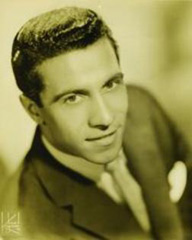 n his heyday in the 1950s, Paris performed with everybody—including Charlie Parker, Charles Mingus, Lionel Hampton and Miles Davis—and counted Peggy Lee and Ella Fitzgerald among his most ardent admirers. He was the first singer to record a vocal version of "'Round Midnight" and won several Down Beat polls for Best Male Vocalist. Yet he remained obscure to all but a small group of cognoscenti. De Felitta presents any number of reasons for Paris' failure to hit the big time—a gigantic ego; a combustible temper; relentless perfectionism; a refusal to do as Sinatra did and accept mob backing; the sheer inability of record company executives to understand what Paris was doing. Yet, as De Felitta notes, all these things also were true of singers who are now household names. Paris' failure to become famous most likely will remain as inexplicable as the disappearance of Ambrose Bierce. n his heyday in the 1950s, Paris performed with everybody—including Charlie Parker, Charles Mingus, Lionel Hampton and Miles Davis—and counted Peggy Lee and Ella Fitzgerald among his most ardent admirers. He was the first singer to record a vocal version of "'Round Midnight" and won several Down Beat polls for Best Male Vocalist. Yet he remained obscure to all but a small group of cognoscenti. De Felitta presents any number of reasons for Paris' failure to hit the big time—a gigantic ego; a combustible temper; relentless perfectionism; a refusal to do as Sinatra did and accept mob backing; the sheer inability of record company executives to understand what Paris was doing. Yet, as De Felitta notes, all these things also were true of singers who are now household names. Paris' failure to become famous most likely will remain as inexplicable as the disappearance of Ambrose Bierce.
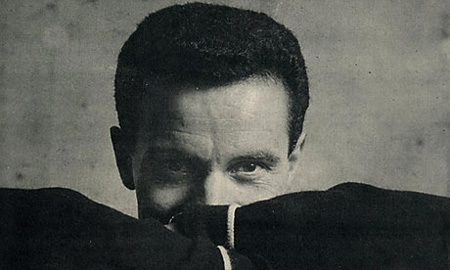 |
Yet there is another, even sadder side to Paris' story that De Felitta explores at length: the pain and sorrow within Paris' family. Paris was saddled with a brutal father, a junkie brother (Paris himself didn't even smoke cigarettes, a rarity in his place and time), and many failed marriages and relationships. Throughout his interviews with De Felitta, Paris insisted he was happy with his life; yet when De Felitta asked him if he ever had children, Paris answered with an immediate, dismissive "No." The truth of the matter, when De Felitta reveals it, will break your heart.
Again, I don't want to reveal too much of the plot of City Island. But perhaps, in writing the screenplay, did De Felitta have Jackie Paris' story in the back of his mind when he created Vince Rizzo, and use Vince as a way to make amends for Paris, as Briony Tallis used her final novel to rewrite her life in Atonement? See both movies, and judge for yourself.
|
|



